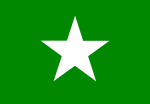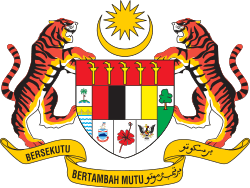Pan-Malaysian Islamic Front
| Pan-Malaysian Islamic Front Barisan Jemaah Islamiah Se-Malaysia باريسن جماعه اسلاميه سمليسا | |
|---|---|
 | |
| Abbreviation | BERJASA |
| Founder | Mohamad Nasir |
| Founded | 1977 |
| Split from | Pan-Malaysian Islamic Party |
| Headquarters | Pasir Mas, Kelantan |
| Ideology |
Islamic democracy Anti-communism Conservatism |
| Political position | Centre-right to Right-wing |
| Religion | Sunni Islam |
| National affiliation |
Barisan Nasional Angkatan Perpaduan Ummah (1990–96) |
| Colours | Green, white |
| Dewan Negara: |
0 / 70 |
| Dewan Rakyat: |
0 / 222 |
| Dewan Undangan Negeri: |
0 / 576 |
|
Politics of Malaysia Political parties Elections | |
 |
| This article is part of a series on the politics and government of Malaysia |
|
|
|
Politics portal |
The Pan-Malaysian Islamic Front (Malay: Barisan Jemaah Islamiah Se-Malaysia, Jawi: باريسن جماعه اسلاميه سمليسا often known by its acronym BERJASA) is a political party in Malaysia.
The party was founded in 1977 by the then Chief Minister of Kelantan, Mohamad Nasir, under the persuasion of United Malays National Organisation (UMNO) who were dissatisfied with the demands made by the Pan-Malaysian Islamic Party (PAS). These demands included internal squabbles for the lump share in controlling the state of Kelantan, and pressure from UMNO soon led to PAS withdrawing from Barisan Nasional. In the following year's general elections, the split cost the PAS a huge number of votes in Kelantan: among the 36 state seats in Kelantan, UMNO won twenty three, Berjasa won eleven, and PAS won only two.[1]
BERJASA subsequently joined Barisan Nasional, but support for BERJASA quickly dissolved in the subsequent general elections. In 1989, it joined Angkatan Perpaduan Ummah under the leadership of Parti Melayu Semangat 46 and the alliance was subsequently dissolved in 1996 when Tengku Razaleigh decided to dissolve APU and rejoin UMNO. Since then, BERJASA has only maintained minimal participation in the political fray,[2] as evidenced from their participations in the subsequent General Elections.[3]
References
- ↑ In-Won Hwang. Personalized Politics. Alpha Books. pp. 117–8. ISBN 981-230-185-2.
- ↑ Michael Leifer. Dictionary of the Modern Politics of South-East Asia. Taylor & Francis. p. 73. ISBN 0-415-23875-7.
- ↑ 29 political parties register with Election Commission